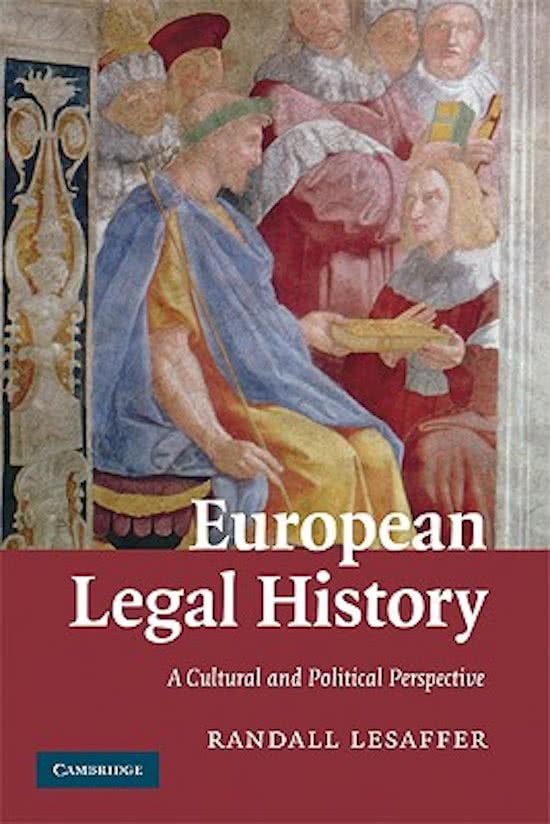European History - PART I / Antiquity: Classical
Greece and Rome (Includes Lecture Material,
Mandatory Study Material-Videos, Book Parts)
LECTURE 1
INTRODUCTION
- Tension between Diversity and Unity (400 BC)
- Greece was not a unitary state, it was a mosaic of political entities called “Poleis”
- Attica (City State) + Athens (Capital City State = Polis)
DIVERSITY in Ancient Greece
- Each of these Polis have their own political system and are autonomous
(Sovereign States) fE Lakonia = has Monarchy
- Each poltical system could make their own decisions for their own region
(Structure, Economics, Military etc). City States have nothing to do with each
other politically
- Constant wars ongoing between the City States about Trade Issues or Land fE
(Polynesian War was the biggest)
- Geography: 75% covered with Mountains, some areas were di cult to reach
- Athens started to build an empire 5 BC and lost some places while
- Islands of Aegan Sea = Cyclades, Island facilitated to Diversity in Greece
UNITY in Ancient Greece
- There was some sense of unity, “Hellas” or “Hellenes” was the name they used as
Ancient Greek for Shared Identity (But in cities it was Athenes, Spartans…)
- Another part of Unity was speaking the same language but they had di erent
dialects in di erent parts; but they could all understand each other
- Share the same Religion: Statesmen, Citizens would visit Temples to ask for
advice to the Gods; “Pythia” (Female Priestess) would be at the temple and ravel
on sharing prophesies of Apollo and the Priest would interpret her words
1
ff ffi ff
, - Priests were also involved in Politics and could stir some things up with their
knowledge
- Athletic: Panhellenic Games = Olympic Games, religious events
ANCIENT GREECE PERIODISATION
1. ca. 3000 - ca. 1100 BC: Bronze Age
2. ca. 1100 - 800 BC: Dark Age
3. ca. 800 - ca. 500 BC: Archaic Period
4. 490-323 BC: Classical Period: Most important results, outcomes and events
with Special Attention to Athens and Sparta
5. 323-30 BC: Hellenistic Period
Athens, The Cradle of Democracy
- The term democracy was used for the very rst time: Demos kratos = “Rule of the
People”
- The concept was invented by Athens
- After Athens lost its autonomy (After Alexander TG died), democracy disappeared
from the Radar for many ages
- Modern Day Democracy has roots in the Enlightment and Age of Reason and
paved the way for democracies to come in (Ideas of Locke could be a base for
example)
The Constitutional History of Athens
I. ARISTOCRACY (7th Century BC)
- Grew rationally
- Main source is Aristotle’s “Athenaion Politeia” = Constitution of Athens but there
was no 1 document in Athens that combined all
- Ruled by the best (Criterion: Birth) = You can only be a ruler or participant in
Politics if you come from a Aristocratic family
- Athens was ruled by 9 Archons(= Ruler)
> Were in charge di erent things: Polemarch (Military), Archon basilieus (Religion),
Archon eponymous (President over the Council, Public A airs)
> Aristocratic Families (Eupatrids) and they were yearly elected o cials or
magistrates; made a lot of juristical decisions too
- Council of the Areopagus, all former archons become a member after their term
ends
2
ff fi ff ffi
Greece and Rome (Includes Lecture Material,
Mandatory Study Material-Videos, Book Parts)
LECTURE 1
INTRODUCTION
- Tension between Diversity and Unity (400 BC)
- Greece was not a unitary state, it was a mosaic of political entities called “Poleis”
- Attica (City State) + Athens (Capital City State = Polis)
DIVERSITY in Ancient Greece
- Each of these Polis have their own political system and are autonomous
(Sovereign States) fE Lakonia = has Monarchy
- Each poltical system could make their own decisions for their own region
(Structure, Economics, Military etc). City States have nothing to do with each
other politically
- Constant wars ongoing between the City States about Trade Issues or Land fE
(Polynesian War was the biggest)
- Geography: 75% covered with Mountains, some areas were di cult to reach
- Athens started to build an empire 5 BC and lost some places while
- Islands of Aegan Sea = Cyclades, Island facilitated to Diversity in Greece
UNITY in Ancient Greece
- There was some sense of unity, “Hellas” or “Hellenes” was the name they used as
Ancient Greek for Shared Identity (But in cities it was Athenes, Spartans…)
- Another part of Unity was speaking the same language but they had di erent
dialects in di erent parts; but they could all understand each other
- Share the same Religion: Statesmen, Citizens would visit Temples to ask for
advice to the Gods; “Pythia” (Female Priestess) would be at the temple and ravel
on sharing prophesies of Apollo and the Priest would interpret her words
1
ff ffi ff
, - Priests were also involved in Politics and could stir some things up with their
knowledge
- Athletic: Panhellenic Games = Olympic Games, religious events
ANCIENT GREECE PERIODISATION
1. ca. 3000 - ca. 1100 BC: Bronze Age
2. ca. 1100 - 800 BC: Dark Age
3. ca. 800 - ca. 500 BC: Archaic Period
4. 490-323 BC: Classical Period: Most important results, outcomes and events
with Special Attention to Athens and Sparta
5. 323-30 BC: Hellenistic Period
Athens, The Cradle of Democracy
- The term democracy was used for the very rst time: Demos kratos = “Rule of the
People”
- The concept was invented by Athens
- After Athens lost its autonomy (After Alexander TG died), democracy disappeared
from the Radar for many ages
- Modern Day Democracy has roots in the Enlightment and Age of Reason and
paved the way for democracies to come in (Ideas of Locke could be a base for
example)
The Constitutional History of Athens
I. ARISTOCRACY (7th Century BC)
- Grew rationally
- Main source is Aristotle’s “Athenaion Politeia” = Constitution of Athens but there
was no 1 document in Athens that combined all
- Ruled by the best (Criterion: Birth) = You can only be a ruler or participant in
Politics if you come from a Aristocratic family
- Athens was ruled by 9 Archons(= Ruler)
> Were in charge di erent things: Polemarch (Military), Archon basilieus (Religion),
Archon eponymous (President over the Council, Public A airs)
> Aristocratic Families (Eupatrids) and they were yearly elected o cials or
magistrates; made a lot of juristical decisions too
- Council of the Areopagus, all former archons become a member after their term
ends
2
ff fi ff ffi












